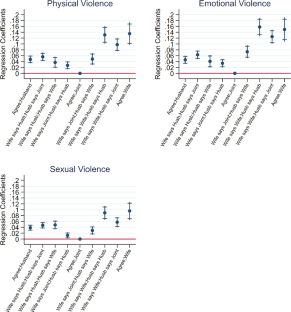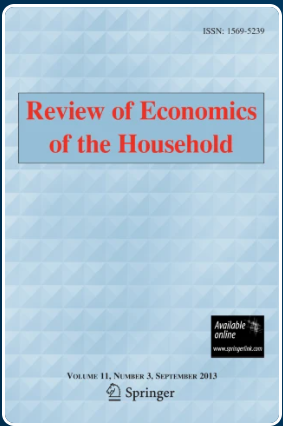Sharing responsibility through joint decision-making and implications for intimate-partner violence: evidence from 12 Sub-Saharan African Countries
IF 2.2
3区 经济学
Q1 ECONOMICS
引用次数: 0
Abstract
Intimate partner violence (IPV) affects 36% of women in Sub-Saharan Africa. In this paper, we examine the relationship between decision-making within 31,243 couples and the incidence of IPV across 12 African countries. Using the wife’s responses to survey questions, we find that compared to joint decision-making, sole decision-making by the husband is associated with a 3.3 percentage point higher incidence of physical IPV in the last year, while sole decision-making by the wife is associated with a 10 percentage point higher incidence. Similar patterns hold for emotional and sexual violence. When we include the combined responses of the husband and wife about decision-making in the analysis, we identify joint decision-making as protective only when spouses agree that decisions are made jointly. Notably, agreement on joint decision-making is associated with lower IPV than agreement on decision-making by the husband. Constructs undergirding common IPV theories, namely attitudes towards violence, similarity of preferences, marital capital, and bargaining, do not explain the relationship. Our results are instead consistent with joint decision-making as a mechanism that allows spouses to share responsibility and mitigate conflict if the decision is later regretted.

通过共同决策分担责任及其对亲密伴侣暴力的影响:来自12个撒哈拉以南非洲国家的证据
亲密伴侣暴力(IPV)影响着撒哈拉以南非洲36%的妇女。在本文中,我们研究了12个非洲国家的31,243对夫妇的决策与IPV发病率之间的关系。利用妻子对调查问题的回答,我们发现,与共同决策相比,丈夫单独决策与去年身体IPV发生率高出3.3个百分点有关,而妻子单独决策与发生率高出10个百分点有关。类似的模式也适用于情感暴力和性暴力。当我们在分析中包括丈夫和妻子对决策的综合反应时,我们认为只有当配偶同意共同做出决策时,共同决策才具有保护作用。值得注意的是,同意共同决策比同意丈夫决策与较低的IPV相关。共同IPV理论的基础结构,即对暴力的态度、偏好的相似性、婚姻资本和讨价还价,并不能解释这种关系。相反,我们的研究结果与共同决策作为一种机制是一致的,这种机制允许配偶分担责任,并在决定之后后悔时减轻冲突。
本文章由计算机程序翻译,如有差异,请以英文原文为准。
求助全文
约1分钟内获得全文
求助全文
来源期刊

Review of Economics of the Household
ECONOMICS-
CiteScore
9.30
自引率
3.90%
发文量
39
期刊介绍:
The Review of Economics of the Household publishes high-quality empirical and theoretical research on the economic behavior and decision-making processes of single and multi-person households. The Review is not wedded to any particular models or methods. It welcomes both macro-economic and micro-level applications. Household decisions analyzed in this journal include · household production of human capital, health, nutrition/food, childcare, and eldercare, · well-being of persons living in households, issues of gender and power, · fertility and risky behaviors, · consumption, savings and wealth accumulation, · labor force participation and time use,· household formation (including marriage, cohabitation and fertility) and dissolution,· migration, intergenerational transfers,· experiments involving households,· religiosity and civility.The journal is particularly interested in policy-relevant economic analyses and equally interested in applications to countries at various levels of economic development. The Perspectives section covers articles on the history of economic thought and review articles. Officially cited as: Rev Econ Household
 求助内容:
求助内容: 应助结果提醒方式:
应助结果提醒方式:


